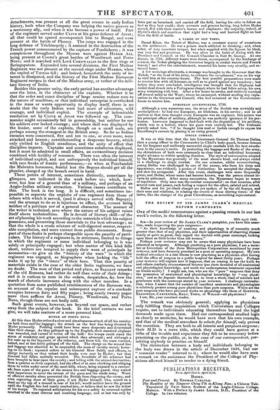THE REVIEW OF SIR JAMES CLARK'S MEDICAL REFORM PAMPHLETS.
ONE of the mediei remonstrates against a passing remark in our last week's notice, in the following letter.
26th April 1843. Sta—In your review of Sir JAMES CLARK'S pamphlet, you have this asser- tion, made respecting the pure surgeons-
'. As their knowledge of anatomy and physiology is of necessity much greater than that of any physician, and their opportunities of observing disease nearly or quite as great, they regard the doctors with great contempt, looking upon them as little better than old women."
Perhaps your reviewer may not be aware that many physicians have been educated as surgeons. Although practising as a pore physician, I am a mem- ber or Licentiate of the three Metropolitan Corporations mentioned by your reviewer, and have formerly practised as a pure or operating surgeon. My own medical attendant in a late illness is now practising as a physician after having held the office of surgeon to a public hospital for about thirty years. Perhaps your reviewer will explain how it happens, that on ceasing to use the knife we and others similarly circumstanced become ipso facto denuded of all anatomical and physiological knowledge, and merit the contemptuous treatment expended on female utility ? I might ask, too, who are the " pure" surgeons that deny the possession of anatomical and physiological knowledge by " any physi- cian," and so far degrade themselves as to treat a whole class of scholars and gentlemen with the contempt stated by your reviewer. I challenge contradic- tion, when I assert that the number of excellent anatomists and physiologists is relatively greater among pure physicians than pure surgeons. Where are the pure surgeons who have produced works on physiology like those of BOSTOCK, ELLIOTSON, CARPENTER, BALT, TODD, or WILLIS—all physicians! I am, Sir, your constant reader, A.
The remark was obviously general; applying to physicians only fulfilling those requisitions which Universities and Colleges require, not to individuals educating themselves beyond the legal demands made upon them. Had our correspondent studied logic as closely as medicine, he would have seen that his own example,
and that of the medical attendant he selects for himself, only proves the assertion. They are both to all intents and purposes surgeoras ; their M.D. is a mere title, which they could have gotten at a tithe of the trouble and experience they felt to be necessary before
practising on the public, or, in the case of our correspondent, per- mitting anybody to practise on himself.
The distinction between a body and individuals belonging to the body was drawn in the article of December 1838, had our " constant reader" referred to it ; where he would also have seen a remark on the assistance the President of the College of Phy- sicians allowed himself to render to a dying friend.


























 Previous page
Previous page